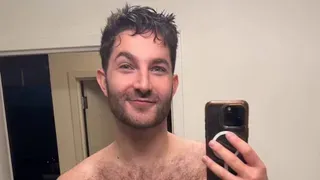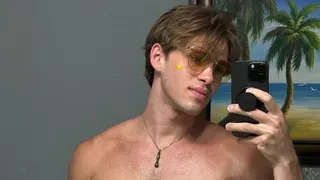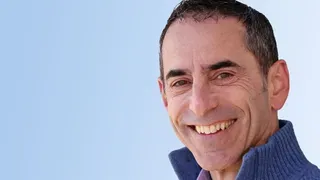March 12, 2021
'Reality Check' - Fred Rosser and Michael Musto on the Broadway Dream of 'Theality'
Kilian Melloy READ TIME: 9 MIN.
"Every little boy has a dream," the opening quote to the ten-episode reality show "Theality" tells us. "And that dream is to have a hit musical in Broadway."
The quote is from Rob Gould, the writer and director of a long-gestating Broadway musical called "Little House on the Ferry." When his dreams of a Broadway sensation run up against the reality television format will it be the entertainment world's version of a train wreck? Or will it be the tastiest collision since chocolate and peanut butter bumbled into a single classic treat?
Set on Fire Island over the same weekend as the 2015 Supreme Court ruling that struck down barriers to same-sex marriage in all 50 states, "Little House on the Ferry" deals with - what else? - a romantic triangle. How can it not be a hit?
When Gould's friend, Broadway financier Ike Avelli, flies him to New York to make a pitch to bring the play to the stage, Gould has high hopes for a top-notch production and maybe a national tour. But what Avelli offers (with a straight face) is a single month to rehearse, a one-night-only production intended to play to an off-off-Broadway house full of deep-pockets types, and a ten thousand dollar budget - an amount so parsimonious, it's beyond paltry.
The show's setup is so absurd you can't believe that "Theality" is anything other than a "Waiting for Guffman"-style mockumentary. The show's editing - designed to create a broadly comic effect - and the introduction of Fred Rosser, an openly gay WWE star whose only acting experience is having wrestled under the name Darren Young, only deepens that impression, as does Avelli's no-nonsense ultimatum: Rosser will be in the cast, or the show's off. With the clock ticking (only three days for the casting process!), Gould, his assistant director Tym Moss, and casting director RJ Magee set about "winging it," and Rosser only complicates matters when he invites himself to their deliberations.
Served up in bite-sized episodes of about 20 minutes each, the show feels like a late-night, cult-favorite sitcom from another age. The addition of celebrity theater critic Michael Musto to the mix adds to the show's surreality quotient, and yet, Musto and Rosser both tell EDGE, "Theality" is "as real as it gets."
Read on to find out what more they had to tell us about the madness of producing a musical under such impossible circumstances, and how a musical about marriage equality is a show whose time has come.
EDGE: How did you end up being involved in the show?
Michael Musto: Tym Moss (one of the actors in the show within the show) is a friend of mine and he asked me to be part of it, at the behest of creator Rob Gould, who knows of my theater writings and my longtime appearances on a TV show called Theater Talk. I was perfect to swoop in as a professional journalist who knows about theater and would speak some truths about the show they were mounting, as well as offering some comforts.
EDGE: There's a real Christopher Guest vibe about the show. How real is "Theality?"
Fred Rosser: Some of it was as real as it gets. A lot of it happened organically, and they just so happened to capture it on tape.
Michael Musto: While it may at times come off like "Waiting For Guffman," it's real!!! I deplore the fakeries of reality TV, but this show had actual camaraderie, challenges, and resentments galore. Lots of real fuming, hugging, and panic attacks! The premise – throwing together a production with a tight deadline – made for such great interactions and confrontations that you didn't have to make stuff up.
EDGE: Fred, the way you come across in the series, you're a force of nature: You charge in, you get your hands on the project, you go to the meetings, you want to know everything and make yourself a part of the process.
Fred Rosser: Well, the thing is, I am a shy guy by nature, but my work ethic is as good as it gets. I was always the first one there, the last one to leave. I had zero experience, so I wanted to be the hardest and smartest worker in the room... I wanted to be surrounding myself with people who had experience in off-Broadway [productions].
EDGE: So, Fred, you really came in cold, with no theatrical experience whatsoever?
Fred Rosser: I had no singing, I had no dancing experience. A lot of other talent on-set had experience in the musical, so for every song we rehearsed it would take them open or two tried to get it right; it would take me five of six or seven times to get it right.
EDGE: When you're first being introduced on camera to Rob, Tym, and casting director RJ Magee, you point out that, "Wrestling is kind of acting." How well were you able to draw on the skills you developed as a wrestler for your stage work?
Fred Rosser: It was a challenge, because being a masculine wrestler, we all wants to appear tough and all that other craziness, but when you get embraced into the off-Broadway musical like I did, it's like you have to be little bit softer, a little bit gentler. Listening to the crowd is so important in wrestling, and with the musical... I had a solo, which was called "A Match for Me," and I practiced and practiced, and when we finally did it in front of the crowd, I could hear the people really rooting for me. After I exited the stage, I was crying my eyes out. I went up to some of the actors and said, "This is amazing." All of the actors said at the same time, "This is why we do it," because of the connection they have with the crowd. I've felt emotions in the ring, but to feel it in a different type of setting, on a theater stage, was incredible.
EDGE: "Theality" has a larger-than-life feel and a madcap energy. Was it easy for you to join in with that?
Michael Musto: When I was first introduced to Rob, he was screaming at someone and I thought, "First of all, I feel at home, lol. Secondly, this will be interesting because this is a pressure cooker situation that is going to be drawing out some fascinating behavior from people, and I can sort of float around it all like some kind of oracle, also being a sort of MC slash carnival barker for the post-mortem." My role in the show was to interview the creatives, do red carpet at the opening, and then host a followup Q&A with everyone about what went right and wrong. That, I feel, is the best episode of all, because people really let it fly.
Fred Rosser: All the episodes were a lot of fun. My mom, who's also gay, she was involved in it; she was as real as it gets, too, so definitely enjoy the camaraderie and banter between my mom and I.
EDGE: Really, your mom is gay, too? When you came out to her, what was her response?
Fred Rosser: [chuckles] Well, it's funny, because she came out to me when I was about seven or eight years old. I didn't come out to her until I was 28. I didn't come out to the world until I was 30. The reason why I didn't come out to her sooner was because back in the '80s the science wasn't as strong as it is today for same-sex couples to have kids, my mom was always saying, "Oh, I can't wait for when you get older and I get to have grandchildren!" No one wants to let their mom down, you know? So, I suppressed those feelings for so long, until enough was enough, and then I ultimately came out to her at 28. She was very supportive.
EDGE: So, overall, this madcap adventure has been a fun and positive experience.
Fred Rosser: I'd do it again if I had the opportunity to take the musical on tour. If this pandemic hadn't happened, most likely we could have taken this musical in tour and I would be right on board with it.
EDGE: That would have been interesting. Michael, would you have wanted to be involved with that if it had happened?
Michael Musto: I am part of Theality TV, not part of "Little House on the Ferry" per se, so if it toured, I don't think I would have gone along, unless Rob Gould decided to film a season about that. And that definitely would have been great TV - life on the road with these frisky upstarts. But COVID, of course, scuttled everything and we all dutifully sat home and waited things out. We are chomping at the bit for theater again, and so is everyone else - and Theality TV satisfies that craving.
Fred Rosser: Any time I do interviews like this people ask me, "How was your 2020?" I always have to say, "Knock on wood, I'm blessed to have taken on this project, this off-Broadway musical about marriage equality, and it was a dream come true."
EDGE: The theme of marriage equality seems like a natural fit for a Broadway musical. How has there not been one until now?
Michael Musto: There have been a lot of gay dramas and comedies on Broadway, but not nearly enough musicals. "Ferry" is far from "Rent" (It's way more of a romp, though it has tearjerky moments) and it isn't "Fun Home" either. And while "It Shoulda Been You" (2015) was a musical about a woman who's marrying a man but turns out to be a lesbian, "Little House on the Ferry" is more fun and more out. The time is right.
EDGE: Was it that theme that, if you will, relegated "Little House on the Ferry" to the margins where an off-Broadway play could encounter the sorts of restrictions and requirements that the play's producers, cast, and crew have to contend with?
Michael Musto: I don't feel the theme relegates the show to the margins. Broadway audiences have lapped up gay themes for many years. But yes, off-Broadway is more conducive to the DIY way the musical was put together, though naturally the hope is that more and more work and budget can be put into it through the years and it can keep evolving into bigger theaters. You forget that Rob first started this show in 1941, lol. This is the ultimate work in progress.
"Theality" is streaming now at Broadway on Demand and theality.tv.
Kilian Melloy serves as EDGE Media Network's Associate Arts Editor and Staff Contributor. His professional memberships include the National Lesbian & Gay Journalists Association, the Boston Online Film Critics Association, The Gay and Lesbian Entertainment Critics Association, and the Boston Theater Critics Association's Elliot Norton Awards Committee.






